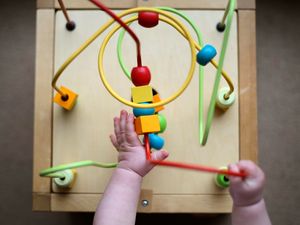Babies and young children failed by pandemic response, survey finds
Almost two-thirds of health visitors in England reported an increase in cases of child neglect, according to the figures.

Babies and young children have been “forgotten and failed” in the nation’s pandemic response, health visiting leaders have said.
The Institute of Health Visiting’s annual survey, published on Monday, found that almost two-thirds (61%) of health visitors in England reported an increase in cases of child neglect.
It also found that four-out-of-five health visitors reported a rise in domestic violence and abuse, and perinatal mental illness.
The institute said the findings laid bare the “damage” that the pandemic has had on families, with the youngest and most vulnerable suffering the most.
Alison Morton, deputy executive director, said that while the coronavirus vaccine brought a “glimmer of a light at the end of the tunnel”, babies and young children cannot wait.
She added: “Babies and young children were largely invisible in the first wave of the Government’s emergency plans.
“With a growing body of evidence, we now know that many children are being harmed by the secondary impact of the pandemic and we cannot knowingly overlook their needs again, as we live with the virus for the foreseeable future.
“Failing to effectively address their needs will only store up significant problems for the future.”
The Institute of Health Visiting said that despite evidence the first 1,001 days are the most crucial period of human development, babies and young children had been largely forgotten by policy makers, with the Government focused more on the need to treat infected patients, mostly adults.
Babies and young children in disadvantaged families had been “disproportionately impacted” by Covid-19 due to factors such as overcrowded housing with lack of outdoor space, the impact of poverty, and parental stress and anxiety, it added.
The institute said that due to cuts in public health budgets, health visiting entered the pandemic in an “already depleted state” with a 31% reduction in health visitors since 2015.
This left many health visiting services “ill-prepared to meet the rapidly rising levels of need” since the early weeks of the lockdown and many vulnerable babies and young children without the support that they needed, it added.
The survey also found that 65% of health visitors had caseloads of more than 300 children under five, 29% reported caseloads of 500 or more children and 12% caseloads of more than 700 children, with one health visitor reporting a caseload of 3,000 children.
The institute said the optimum maximum caseload for effective practice was 250 children, but fewer in areas of high vulnerability.
The institute said it was vital that a long-term plan is put in place to protect the health visiting workforce to ensure the crucial services they provide are not at risk from future policy changes.
Andrew Fellowes, associate head of policy and public affairs at the NSPCC, said the Government needed to act to avoid “failing a generation of children”.
He added: “The findings from the Institute of Health Visiting echo our concerns about the devastating impact of the health crisis on pregnant, new mothers and families.
“The pandemic has had an unprecedented effect on families everywhere.
“We have seen an increase in stress, poverty and domestic violence, and this coupled with restricted access to vital support services has created a situation where too many infants face increased risk of harm.
“We know that when parents experience poor mental health, as well as this having a detrimental impact on them it can seriously affect their babies’ development too.”





